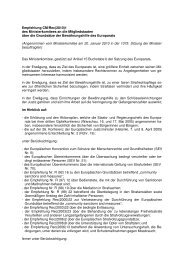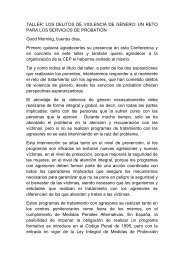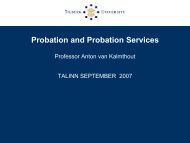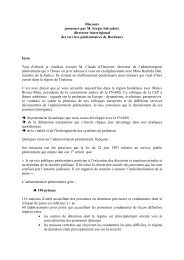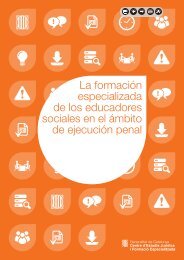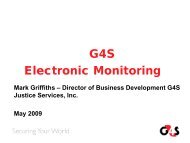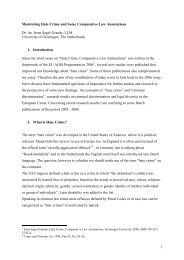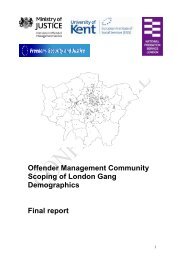Report EM 2005 - E - CEP, the European Organisation for Probation
Report EM 2005 - E - CEP, the European Organisation for Probation
Report EM 2005 - E - CEP, the European Organisation for Probation
Create successful ePaper yourself
Turn your PDF publications into a flip-book with our unique Google optimized e-Paper software.
The views of participants were in<strong>for</strong>med to some extent by empirical research in <strong>the</strong>ir<br />
countries in organisations, but ra<strong>the</strong>r more by anecdotal evidence and opinion.<br />
It was suggested that <strong>the</strong> next conference might include representatives of <strong>the</strong> police,<br />
whose involvement in electronic monitoring was increasing.<br />
5.2 Offender perspectives on electronic monitoring<br />
Mike Nellis<br />
Mike Nellis explained why it was important to seek offender perspectives on electronic<br />
monitoring – <strong>the</strong>y had a right to be heard, it made it easier to understand <strong>the</strong> actual<br />
personal impact of a penalty on an offender (and family), and it helped us to compare<br />
<strong>the</strong> effectiveness of one penalty with ano<strong>the</strong>r. Offender perspective studies had <strong>the</strong>ir<br />
limitations, but had developed criteria <strong>for</strong> understanding <strong>the</strong> severity of punishment<br />
(Gresham Sykes, 1958) and had compared <strong>the</strong> pains of imprisonment with <strong>the</strong> pains of<br />
electronic monitoring (B Payne and R Gainey, 1998). Proper offender perspective studies<br />
could help answer questions like “Can electronic monitoring be rehabilitative”, “Is<br />
consent to a community penalty necessary” and “What ways of ensuring compliance<br />
help bring about desistance from crime” He summarised <strong>the</strong> offender perspectives on<br />
<strong>the</strong> satellite-tracking pilots in England and Wales (<strong>for</strong> which he was part of <strong>the</strong><br />
evaluation team).<br />
In <strong>the</strong> discussion, participants asked whe<strong>the</strong>r electronic monitoring increased domestic<br />
tensions and concluded that it did, in some small ways, but <strong>the</strong>re had been some very<br />
difficult individual cases. Were offenders prepared enough <strong>for</strong> being on electronic<br />
monitoring Did <strong>the</strong>y view it as shaming or stigmatising (and should it have this effect)<br />
There was very little research on this. Would GPS tracking be seen as a soft option in<br />
10 years’ time<br />
Most participants who contributed to <strong>the</strong> discussion referred to research results, <strong>for</strong><br />
example in Sweden where offenders had to be persuaded to go on <strong>the</strong> post-release<br />
electronic monitoring scheme because it was so onerous. Also, it was noted that some<br />
electronic monitoring companies collected offender views at <strong>the</strong> end of <strong>the</strong> monitoring;<br />
Reliance, who were operating in Scotland, fed <strong>the</strong>se back to sentencers.<br />
Among <strong>the</strong> key points that participants took away from <strong>the</strong> workshop were <strong>the</strong> sense<br />
that electronic monitoring was not a complete solution that replaced <strong>the</strong> need <strong>for</strong><br />
personal human services; and that ways should be found to in<strong>for</strong>m sentencers more fully<br />
about offenders’ experiences of electronic monitoring.<br />
It was suggested that <strong>the</strong> next conference should place <strong>the</strong> discussion of electronic<br />
monitoring in <strong>the</strong> context of changes in – and <strong>the</strong> strengths of – probation.<br />
14


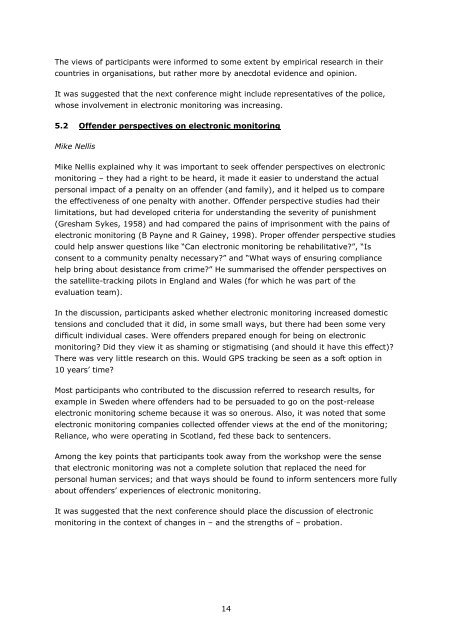
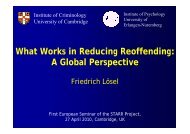
![AGIS2 Nov 08 Conference Report_[Version 2] - CEP, the European ...](https://img.yumpu.com/50764570/1/190x245/agis2-nov-08-conference-report-version-2-cep-the-european-.jpg?quality=85)
